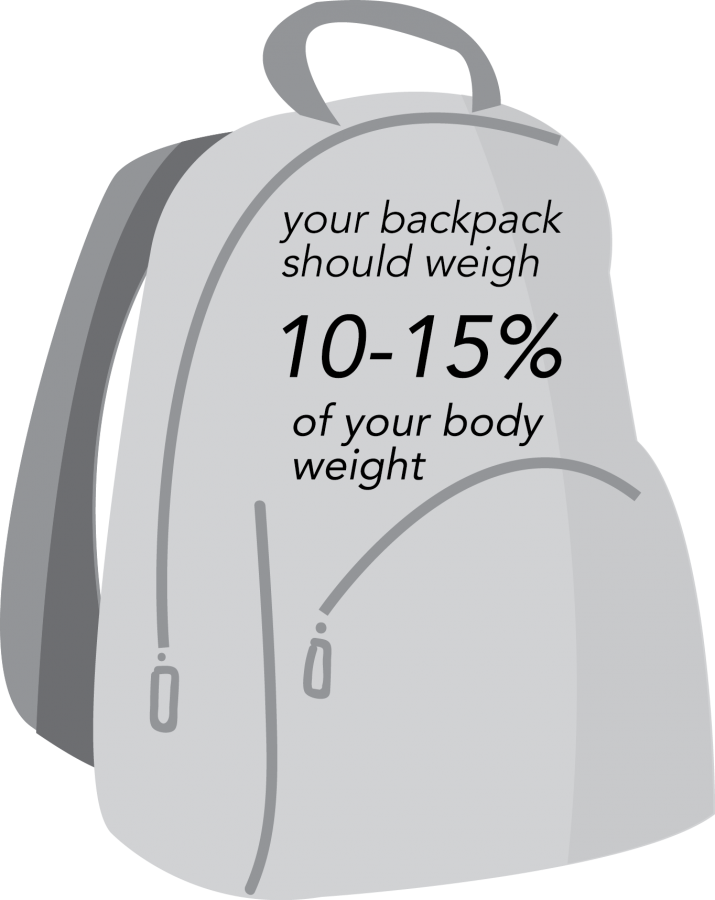Backpacks impact backs ergonomically
November 18, 2016
Despite the common belief that backpacks cannot cause chronic back problems, the heavy everyday burden of textbooks and binders can severely endanger students’ backs.
Of the 147 upper school students who answered the Winged Post’s survey, 97.3 percent carry backpacks on their backs.
Upper school nurse Clare Elchert advises students not to carry a heavy backpack because of the consequences as a result.
“Well, certainly carrying a heavy load on a daily basis and maybe slinging it over one shoulder, not making sure the weight is equally distributed with both straps on your backpack, can affect your alignment over time,” she said.
Dr. Melvin S. Hsu is a chiropractic specialist in disc spinal decompression therapy at Unison Spine Center in Sunnyvale, California.
“It can cause your body to be leaning forward to compensate for the heavy backpack, and the compression, the weight of your backpack, can cause abnormal curvature of the spine,” he said. “We call that scoliosis.”
Heavy backpacks, especially those carried on one shoulder, pose the risk of inducing lateral curvature of the spine, also known as scoliosis.
“If you develop a curvature or scoliosis of the spine, it can have severe consequences for a lifetime,” Dr. Hsu said. “it will be difficult to cure, and it can cause chronic back pain.”
Additionally, heavy backpacks cause students’ bodies to lean forward to compensate for the weight. As the student grows older, this can evolve into discomfort and poor posture and eventually may damage concentration.
“If you have back pain, it can also interfere with your concentration, because you are uncomfortable,” Dr. Hsu said. “You cannot sit still or too steady, and then if you require medications, it can have side effects.”
Even with medications, back pain cannot be fully quelled. Medications also pose long-term side effects.
“I wouldn’t go to medications,” Elchert said. “What a person needs to do is to try to correct the problem that’s causing the aches, pains, or strains, which would be using your locker, only carrying books you absolutely need for a particular day, not feeling like you have to live with everything all in your backpack all the time, doing proactive things to avoid the consequences of carrying a heavy load.”
Dr. Hsu recommends for students to carry backpacks weighing no more than 15 percent of their body weight, and a 2004 study conducted by Heather M. Brackley and Dr. Joan M. Stevenson for Spine Journal draws the same conclusion.
Damage of shoulder tissue or tendons can also result from carrying heavy backpacks, often on one shoulder.
“I have tendinitis and problems because I carry things and overuse [my shoulder] too much,” said Amanda Cheung (9). “It’s not convenient to use my locker.”
Despite the fact that lockers allow students to reduce backpack weight, 27.7 percent of surveyed students use their lockers everyday, 48.3 percent never use their locker, 8.8 percent use it every week, 9.5 percent use it a few times a month, and 15.6 percent use it a few times a year..
“Sometimes [my parents] say that I should use my locker and put the books that I don’t need in my locker, but I don’t use it because I like to carry everything in a bag,” Karina Butani (11) said.
While many think that students’ backs are strong enough to support the everyday burden of textbooks and binders, both Dr. Hsu and Elchert advise students to use their lockers or carry textbooks by hand instead of in a backpack to prevent chronic back problems.


















![“[Building nerf blasters] became this outlet of creativity for me that hasn't been matched by anything else. The process [of] making a build complete to your desire is such a painstakingly difficult process, but I've had to learn from [the skills needed from] soldering to proper painting. There's so many different options for everything, if you think about it, it exists. The best part is [that] if it doesn't exist, you can build it yourself," Ishaan Parate said.](https://harkeraquila.com/wp-content/uploads/2022/08/DSC_8149-900x604.jpg)




![“When I came into high school, I was ready to be a follower. But DECA was a game changer for me. It helped me overcome my fear of public speaking, and it's played such a major role in who I've become today. To be able to successfully lead a chapter of 150 students, an officer team and be one of the upperclassmen I once really admired is something I'm [really] proud of,” Anvitha Tummala ('21) said.](https://harkeraquila.com/wp-content/uploads/2021/07/Screen-Shot-2021-07-25-at-9.50.05-AM-900x594.png)







![“I think getting up in the morning and having a sense of purpose [is exciting]. I think without a certain amount of drive, life is kind of obsolete and mundane, and I think having that every single day is what makes each day unique and kind of makes life exciting,” Neymika Jain (12) said.](https://harkeraquila.com/wp-content/uploads/2017/06/Screen-Shot-2017-06-03-at-4.54.16-PM.png)








![“My slogan is ‘slow feet, don’t eat, and I’m hungry.’ You need to run fast to get where you are–you aren't going to get those championships if you aren't fast,” Angel Cervantes (12) said. “I want to do well in school on my tests and in track and win championships for my team. I live by that, [and] I can do that anywhere: in the classroom or on the field.”](https://harkeraquila.com/wp-content/uploads/2018/06/DSC5146-900x601.jpg)
![“[Volleyball has] taught me how to fall correctly, and another thing it taught is that you don’t have to be the best at something to be good at it. If you just hit the ball in a smart way, then it still scores points and you’re good at it. You could be a background player and still make a much bigger impact on the team than you would think,” Anya Gert (’20) said.](https://harkeraquila.com/wp-content/uploads/2020/06/AnnaGert_JinTuan_HoHPhotoEdited-600x900.jpeg)

![“I'm not nearly there yet, but [my confidence has] definitely been getting better since I was pretty shy and timid coming into Harker my freshman year. I know that there's a lot of people that are really confident in what they do, and I really admire them. Everyone's so driven and that has really pushed me to kind of try to find my own place in high school and be more confident,” Alyssa Huang (’20) said.](https://harkeraquila.com/wp-content/uploads/2020/06/AlyssaHuang_EmilyChen_HoHPhoto-900x749.jpeg)








